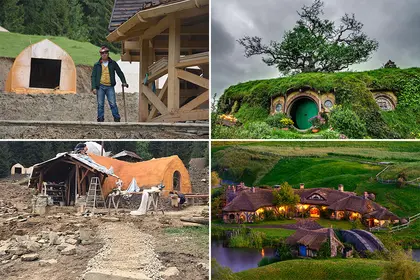The fantasy world of J. R. R. Tolkien’s novels will soon have a real-life replica in Ukraine’s Carpathian Mountains.
A group of enthusiasts is building a village called Hobbithill near the town of Verkhovyna in Ivano-Frankivsk Oblast, some 650 kilometers southwest from Kyiv.
JOIN US ON TELEGRAM
Follow our coverage of the war on the @Kyivpost_official.
Hobbithill will have houses set into hillsides like the “hobbit-holes” of the Shire, where a fictional race of hobbits lives in Tolkien’s “Lord of the Rings” fantasy epic.
“We want to realize the childhood dreams of many adults,” Hobbithill co-founder Andrii Boiechko told the Kyiv Post. “We also want to unglue children from computers and bring them to nature.”
Boiechko is the “viyt” of Hobbithill, the term that was used for mayors in parts of medieval Ukraine, and insists on calling it a small town. His idea is to combine the attributes from Tolkien’s novels with the real-world culture of Ukraine’s Hutsul ethnic group.
Hutsuls have been building houses set into hillsides, called “pyvnytsias,” for thousands of years, according to Boiechko. For them to resemble hobbit-holes, they will have to add just a few things, he says: round doors, bright colors, flowers at the entrance and other decorations.
At least one site with hobbit-style houses already exists. It’s Hobbiton in New Zealand, the movie set of the “Lord of the Rings” film adaptation. Since being transformed into a cinematic Shire by set decorators, the location attracts tens of thousands of Tolkien fans each year.
In Hobbithill, the houses will be from 22 to 33 square meters in area and will have up to three rooms. The enthusiasts plan to build a few tree houses, where elves live in fairytales, and decorate a few nearby caves as homes for dwarves. The area of the village itself is about 1.5 hectares (about two soccer fields), but they plan to buy more land.
Hobbithill will have mountain zip lines and a slope for skiing and sledding in the winter and for zorbing – rolling downhill inside a transparent plastic orb — in the summer. Besides the nearby forest full of berries and mushrooms, the village will have ponds for fishing.
A “kolyba,” a wooden house for shepherds and loggers that became a kind of tavern in the Carpathians, will also serve as a place for social gatherings.
Each hobbit-hole will have its owner, Boiechko says, who will be free to live there or rent it out. Other houses will serve as artisan workshops – for a blacksmith, a baker or a carver – or offices for the post, the press and even customs, to search for “endangered plants” that could have been plucked.
Boiechko’s ideas may seem somewhat unrealistic, but there is a dedicated community that helps move the project along. Hobbithill’s private Facebook group has over 37,000 members. And all 25 hobbit-holes under construction have already found their owners, Boiechko says.
Another 12 may be built, according to him. Anyone can get a hobbit-hole if other owners decide that they will contribute to the community. A person then signs a contract with the landowners and finances the construction. The land belongs to Boiechko and other co-founders.
One of the founders makes the wood-and-metal frames for the houses at a plant in Lutsk, a city some 400 kilometers west of Kyiv. They have a standard design but can be linked and rotated to build custom houses.
After the frame is set on the ground, a special foam is used to strengthen and insulate the construction. The building is then covered with up to 30 centimeters of soil, which creates a hill. Each hobbit-hole will have a special infrared heating and drainage system with a septic tank.
But the construction is not moving along as fast as planned. Boiechko announced that they would finish 10 houses by mid-June and another 10 by mid-July. But, in reality, only his own hobbit-hole is nearing completion. The reasons are the novel coronavirus pandemic, a string of rainy weeks in the Carpathians and delays by the district authorities in installing a high-power electricity network there.
Boiechko now hopes to complete the houses this summer and start building new ones in September. But he is not sure that Hobbithill will be able to welcome tourists this year.
When that finally happens, tourists will be able to visit by buying a “Hobbithill visa,” basically a ticket. Boiechko and other founders have not yet determined the price for such a visa. When asked whether they have a business plan, Boiechko says they don’t, because they don’t view it as a business.
“Hobbithill is just a fairytale town, where anyone can come, build a cheap house or simply have a rest in nature,” he says. “We really want to show the world that miracles can happen.”
You can also highlight the text and press Ctrl + Enter




